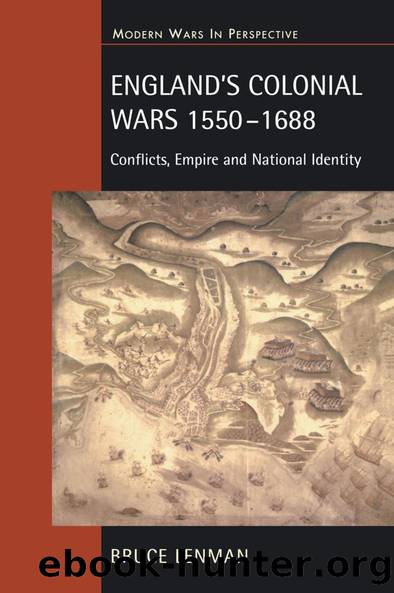England's Colonial Wars 1550-1688 by Bruce Lenman

Author:Bruce Lenman [Lenman, Bruce]
Language: eng
Format: epub
ISBN: 9780582062962
Barnesnoble:
Publisher: Taylor & Francis
Published: 2000-12-06T00:00:00+00:00
The aborting of the overseas dimension of triple kingship
To give him his due, King James hoped to give his Scots and Irish subjects a distinctive role in the overseas expansion and colonisation which was one of the characteristic features of the major early-modern Western European sovereignties. This did mean challenging Luso-Hispanic claims to exclusive rights in both the East and West Indies, though it did not mean that James was anti-Spanish. Indeed, with his accession a historian has rightly said that 'the history of English anti-Hispanism entered a new and less virulent phase'.40 Exponents and developers of the 'Black Legend' of Spanish imperial atrocities during his reign, like the clergyman Thomas Scott, tended to be critics of their monarch's pro-Spanish foreign policy. For James, the right of his subjects to colonise in those vast stretches of both North and South America where the subjects of Philip III had no serious presence was axiomatic, and he correctly regarded the response of the Spanish Crown to the exercise of that right as a test of its real, as distinct from its professed, respect for the Stuart monarchy.
The great privateering offensive by Englishmen into the Caribbean in the late sixteenth century was by definition over after the Peace of London, but it had left an extensive deposit of knowledge about the wealth of the Guiana Caribs and Spanish exploration of the River Orinoco. From 1595, Sir Walter Raleigh was active in the area of Trinidad and the Orinoco delta. It was understandable that in the face of a likely blockade of the Orinoco by Spanish forces drawn from the kingdom of New Granada (modern Colombia), he turned to the River Amazon as an alternative unblocked way of accessing, via one of the Amazon's tributaries, the central area of Guiana, where he was convinced there lay the last great unconquered wealthy Amerindian civilisation.41 By 1607, Sir Walter Raleigh was a prisoner in the Tower of London, desperately trying to persuade James' leading minister, the Earl of Salisbury, to free him to lead an expedition in the course of which he swore 'We will break no peace; invade none of the Spanish towns.'42 In exchange he averred: 'Secondly, if I bring them not to a mountain, near a navigable river, covered with gold and silver ore, let the commander have commission to cut off my head there.'43 Raleigh's alleged samples of the ore were a matter of dispute. This mountain of gold and silver existed only as the wilful self-deception of a desperate projector, but the interest which Raleigh had shown in the Amazon had passed to other Englishmen. In any case, the main north channel of its enormous delta, north of the Ilha Joannes, had by the early seventeenth century become a thriving locus of trade for many different Europeans: French, Dutch, and English among them.
Some of the English were marginal would-be courtiers of Raleigh's stamp. The classic case is Robert Dudley, illegitimate son of the Earl of Leicester, who was enraged by his
Download
This site does not store any files on its server. We only index and link to content provided by other sites. Please contact the content providers to delete copyright contents if any and email us, we'll remove relevant links or contents immediately.
| Africa | Americas |
| Arctic & Antarctica | Asia |
| Australia & Oceania | Europe |
| Middle East | Russia |
| United States | World |
| Ancient Civilizations | Military |
| Historical Study & Educational Resources |
Machine Learning at Scale with H2O by Gregory Keys | David Whiting(4313)
Never by Ken Follett(3957)
Fairy Tale by Stephen King(3399)
Oathbringer (The Stormlight Archive, Book 3) by Brandon Sanderson(3214)
The Man Who Died Twice by Richard Osman(3080)
Will by Will Smith(2920)
Rationality by Steven Pinker(2365)
Can't Hurt Me: Master Your Mind and Defy the Odds - Clean Edition by David Goggins(2341)
The Dark Hours by Michael Connelly(2308)
Friends, Lovers, and the Big Terrible Thing by Matthew Perry(2230)
The Dawn of Everything: A New History of Humanity by David Graeber & David Wengrow(2210)
Principles for Dealing With the Changing World Order: Why Nations Succeed and Fail by Ray Dalio(2055)
A Short History of War by Jeremy Black(1848)
HBR's 10 Must Reads 2022 by Harvard Business Review(1844)
Go Tell the Bees That I Am Gone by Diana Gabaldon(1758)
A Game of Thrones (The Illustrated Edition) by George R. R. Martin(1745)
Kingdom of Ash by Maas Sarah J(1681)
515945210 by Unknown(1667)
443319537 by Unknown(1559)
